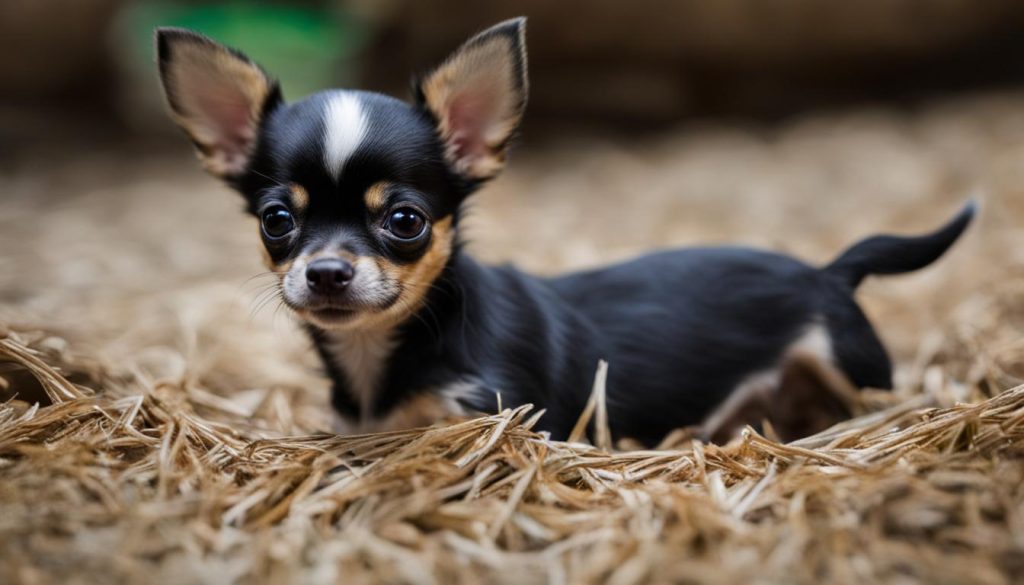When it comes to chihuahuas, a common question that arises is, “How many puppies can a chihuahua have?” The size of a chihuahua’s litter can vary, but on average, chihuahuas have between one and three puppies in a litter.
However, it’s important to note that there can be some exceptions to this average. Some chihuahuas may have smaller litters with only one puppy, while others may have larger litters with up to five or six puppies. The size of the litter can be influenced by various factors, such as the age and health of the mother chihuahua, as well as her genetics.
Key Takeaways:
- Chihuahuas typically have one to three puppies in a litter.
- The size of the litter can vary based on factors such as the mother’s age, health, and genetics.
- Some chihuahuas can have larger litters with up to five or six puppies.
- Proper care and monitoring during the pregnancy are crucial for the health and well-being of the mother and her puppies.
- Consulting with a veterinarian is recommended for any questions or concerns regarding chihuahua pregnancies and litter sizes.
Understanding Chihuahua Pregnancy

Chihuahua pregnancy is a fascinating process that lasts an average of 63 days, with a typical range of 58 to 68 days. During this time, chihuahuas go through three distinct stages of pregnancy: the first trimester, the second trimester, and the third trimester.
In the first trimester, the chihuahua’s body undergoes significant changes as the embryos develop. From day one to day 21, the embryos implant themselves in the uterus and begin to grow. By the end of this trimester, the fetuses will have developed their skeletal structure, and their organs will have started to form.
During the second trimester, which lasts from day 22 to day 42, the chihuahua’s abdomen will start to visibly expand as the puppies continue to grow. This is an exciting time as the mother’s movements may become more apparent, and you may even be able to feel the puppies’ gentle kicks.
The third trimester, from day 43 until delivery, is a crucial period for the final development of the puppies. It is essential to provide your chihuahua with proper nutrition, regular exercise, and veterinary care to ensure the health and well-being of both the mother and her growing litter.
As the chihuahua nears the end of her pregnancy, you might notice behavioral changes, such as nesting behavior or restlessness. It is essential to create a quiet and comfortable nesting area for the mother, where she can give birth and care for her puppies.
Understanding the stages of chihuahua pregnancy is crucial for providing the appropriate care and support needed during this special time. By being attentive and proactive, you can help ensure a successful and healthy birth for your chihuahua and her puppies.
| Pregnancy Stage | Duration |
|---|---|
| First Trimester | Day 1 to Day 21 |
| Second Trimester | Day 22 to Day 42 |
| Third Trimester | Day 43 until delivery |
Health Aspects of Chihuahua Pregnancy

Chihuahua reproduction can be a delicate process, with potential health risks for both the mother and her puppies. It is important to be aware of these health aspects and take necessary precautions to ensure a safe and successful pregnancy.
During chihuahua pregnancy, there are several potential health complications that may arise. These include:
- Hypoglycemia: Chihuahuas have a higher risk of developing low blood sugar during pregnancy, which can be dangerous for both the mother and her puppies.
- Gestational Diabetes: Just like humans, chihuahuas can also develop diabetes during pregnancy.
- Pre-Eclampsia: This condition, characterized by high blood pressure and organ damage, can occur in chihuahuas during pregnancy.
- Dystocia: Dystocia refers to difficulty during labor and delivery, which can be a serious concern for chihuahuas due to their small size.
In order to ensure the health of the mother and her puppies, it is crucial to involve a veterinarian throughout the pregnancy. Regular check-ups and monitoring can help detect any potential complications early on and guide appropriate treatment.
| Potential Health Complications | Risks |
|---|---|
| Hypoglycemia | Increased risk for the mother and puppies |
| Gestational Diabetes | Potential health risks for the mother |
| Pre-Eclampsia | Dangerous condition for the mother |
| Dystocia | Risk of complications during labor and delivery |
Determining Litter Size

When it comes to chihuahua breeding, determining the potential litter size is an important aspect to consider. There are several methods that breeders can use to determine the litter size, including ultrasound and x-ray exams. These methods provide valuable insights into the number of puppies that the chihuahua is carrying.
Chihuahuas are known for having smaller litters compared to other dog breeds. On average, chihuahuas have between one and three puppies in a litter. However, it is important to note that litter size can vary depending on various factors.
Factors such as the age of the mother and her genetics can influence the size of the litter. Older chihuahuas may have smaller litters, while younger chihuahuas may have larger litters. Additionally, the genetics of the chihuahua can play a role in determining litter size, as certain genetic traits can influence the number of puppies born.
It’s essential for chihuahua breeders to be aware of these factors and to consult with a veterinarian for guidance throughout the breeding process. By understanding and monitoring the litter size, breeders can ensure the health and well-being of both the mother and her puppies.
| Factors Influencing Litter Size | Impact |
|---|---|
| Age of the Mother | Older chihuahuas may have smaller litters |
| Genetics | Certain genetic traits can influence litter size |
By taking these factors into consideration, breeders can make informed decisions when it comes to chihuahua breeding and ensure the best possible outcomes for the mother and her puppies.
Birth Process in Chihuahuas

During the birth process of chihuahuas, it is important to be aware of the potential complications that can arise. Chihuahuas can give birth naturally or through a c-section, depending on various factors such as the size of the puppies and the health of the mother.
Dystocia, or difficulty in giving birth, can be a complication that chihuahuas may experience. This can occur due to the size of the puppies being too large for the birth canal or other factors that impede the birthing process. If dystocia is suspected, it is crucial to seek veterinary assistance immediately to ensure the safe delivery of the puppies.
Another potential complication during the birth process is hypoglycemia, which is a sudden drop in blood sugar levels. This can be particularly concerning for chihuahua puppies, as they are small in size and may be more susceptible to fluctuations in blood sugar. Monitoring the mother’s glucose levels and providing proper nutrition can help prevent hypoglycemia in both the mother and the puppies.
Ensuring a comfortable and stress-free environment for the mother during labor is essential. Providing a quiet and warm space, away from disturbances, can help facilitate the birthing process. It is also important to closely observe the mother during labor to ensure there are no complications and that all puppies are delivered safely.
| Common Birth Complications in Chihuahuas | Signs and Symptoms |
|---|---|
| Dystocia | – Prolonged labor – Inability to deliver puppies – Signs of distress |
| Hypoglycemia | – Weakness or lethargy – Shivering or trembling – Loss of appetite |
Caring for Chihuahua Puppies

Proper care for chihuahua puppies is essential to ensure their health and well-being. From providing a safe environment to proper nutrition, socialization, and training, there are various aspects to consider. Here are some key factors to keep in mind when caring for your chihuahua puppies:
1. Safe Environment
Creating a safe environment is crucial to keep your chihuahua puppies protected from potential dangers. Puppy-proof your home by removing hazardous items such as electrical cords, toxic plants, and small objects that can be swallowed. Use baby gates to restrict access to certain areas and provide a cozy bed or crate for your puppies to rest and sleep.
2. Proper Nutrition
Nutrition plays a vital role in the growth and development of chihuahua puppies. Choose a high-quality, age-appropriate puppy food that provides essential nutrients for their specific needs. Feed them small, frequent meals throughout the day to prevent hypoglycemia, a condition that affects small breed puppies. Consult with your veterinarian to determine the best feeding schedule and portion sizes for your chihuahua puppies.
3. Socialization
Expose your chihuahua puppies to different environments, people, and other animals from a young age to promote socialization. This helps them develop confidence, prevent behavior problems, and build positive relationships with others. Plan supervised playdates, introduce them to household sounds, and enroll them in puppy socialization classes to enhance their social skills and ensure they grow up to be well-adjusted dogs.
4. Training and Exercise
Start training your chihuahua puppies as early as possible. Begin with basic commands such as sit, stay, and come, using positive reinforcement techniques like treats and praise. Engage them in interactive games and provide regular exercise to support their physical and mental stimulation. Remember to make training sessions short, fun, and consistent to keep your puppies motivated.
| Age | Feeding Schedule |
|---|---|
| Newborn to 4 weeks | Every 2-3 hours, including overnight |
| 4 weeks to 3 months | 4-5 meals per day |
| 3 months to 6 months | 3 meals per day |
| 6 months to 1 year | 2 meals per day |
| 1 year and older | 1-2 meals per day |
Remember to consult with your veterinarian for specific dietary recommendations and monitor your chihuahua puppies’ weight and overall health regularly.
Chihuahua Breeding
When it comes to chihuahua breeding, it’s important to approach it with careful consideration and a thorough understanding of the breed. Breeding chihuahuas can be a rewarding and potentially lucrative business venture, but it requires knowledge of chihuahua genetics, health considerations, and responsible breeding practices.
One key aspect to consider in chihuahua breeding is the litter size. Chihuahuas generally have smaller litters compared to other dog breeds. On average, a chihuahua can have between one and three puppies in a litter. However, it’s important to note that litter sizes can vary, with some chihuahuas having up to five or six puppies, while others may have just one.
Factors that can influence the litter size include the age and health of the mother chihuahua. Older chihuahuas may have smaller litters, while younger and healthier chihuahuas may have larger ones. Genetics also play a role, as certain bloodlines may be more prone to larger or smaller litter sizes.
Ensuring the health and well-being of the mother chihuahua and her puppies is of utmost importance in chihuahua breeding. Regular veterinary check-ups, proper nutrition, and a safe and clean environment are essential for a successful breeding experience. Breeders should also be prepared to provide appropriate care and support during the whelping process and the early stages of the puppies’ lives.
While chihuahua breeding can be an exciting endeavor, it’s crucial to approach it responsibly and ethically. Breeding should only be done with the intention of improving the breed and producing healthy, well-adjusted puppies. Responsible breeders prioritize the health and welfare of the chihuahuas and work towards eliminating hereditary health issues that may be present in the breed.
| Factors | Influences on Litter Size |
|---|---|
| Age of the mother chihuahua | Older chihuahuas may have smaller litters |
| Health of the mother chihuahua | Healthier chihuahuas may have larger litters |
| Genetics | Certain bloodlines may produce larger or smaller litters |
Pregnancy and Lifespan of Chihuahuas

When it comes to chihuahua pregnancy, it’s important to consider the age and maturity of the dog. Chihuahuas can reach sexual maturity as early as six months, but it is recommended to wait until they are at least one year old before breeding. This gives them time to fully develop and ensures a healthier pregnancy.
On average, a chihuahua will have two to three litters in their lifetime. Each pregnancy should be carefully planned and monitored to ensure the health and well-being of the mother and her puppies. It’s essential to provide the proper nutrition and veterinary care throughout the pregnancy to ensure a successful birth.
Chihuahuas have a longer lifespan compared to other dog breeds, typically living between 12 to 20 years. By providing them with proper care, nutrition, and regular visits to the vet, you can help prolong their lifespan and ensure they live a healthy and happy life.
Costs and Considerations of Chihuahua Breeding
Breeding chihuahuas can be a rewarding venture, but it also comes with its fair share of costs and considerations. As a responsible breeder, it is important to understand the financial implications and take necessary steps to ensure the health and well-being of the mother and puppies.
Veterinary Expenses
Regular vet check-ups are essential throughout the breeding process. These visits help monitor the health of the mother and identify any potential issues early on. The costs of these check-ups can vary depending on the location and the veterinarian’s fees.
Diagnostic Procedures
To determine the health and progress of the pregnancy, ultrasounds and x-rays may be required. Ultrasounds can provide valuable information about the number of puppies and their development, while x-rays can help determine the size and position of the puppies before birth. These procedures can incur additional costs.
Potential C-Sections
Chihuahuas have relatively small pelvises, which can increase the likelihood of complications during delivery. In some cases, a cesarean section (c-section) may be necessary. C-sections require surgical intervention and can be costly. It is important to be prepared for this possibility and have a budget set aside for emergency procedures.
Responsible Breeding Practices
Responsible breeding involves waiting for the chihuahua to reach the second heat cycle before breeding. This allows the mother to mature physically and mentally, reducing the risk of complications during pregnancy and birth. Taking the time to ensure the health and well-being of the mother and puppies is paramount.
Costs and Considerations of Chihuahua Breeding
| Expense | Estimated Cost |
|---|---|
| Veterinary check-ups | $50-$100 per visit |
| Ultrasounds | $100-$300 per session |
| X-rays | $150-$400 per session |
| C-Sections | $1,000-$3,000 or more depending on location and complexity |
As a responsible breeder, it is important to carefully consider the financial implications of breeding chihuahuas. By thoughtfully managing the costs and prioritizing the health of the mother and puppies, you can create a safe and thriving environment for your chihuahua breeding program.
Wrapping Up
Chihuahuas, known for their small size and big personalities, can have varying litter sizes during breeding. On average, a chihuahua will have between one and three puppies in a litter. However, it is important to note that some chihuahuas can have as many as five or six puppies, while others may only have a single pup.
During pregnancy, chihuahuas require proper care and monitoring to ensure the health and well-being of both the mother and her puppies. Regular veterinary check-ups are crucial to detect any potential complications early on. If any concerns arise during pregnancy, such as chihuahua pregnancy complications, it is important to seek veterinary assistance promptly.
Responsible breeding practices are vital for chihuahuas and their offspring. Breeders should prioritize the health and well-being of the mother and her puppies, ensuring they are in optimal condition for breeding. By following proper breeding guidelines, chihuahua breeders can help mitigate potential risks and increase the chances of successful pregnancies and healthy litters.
In summary, chihuahua breeding can be a rewarding endeavor when approached with responsibility and care. Understanding the average litter size and being prepared for potential complications during pregnancy is crucial. By prioritizing the well-being of the mother and her puppies, chihuahua breeders can contribute to the continued health and longevity of this beloved breed.
FAQ
How many puppies can a chihuahua have? What is the average litter size for chihuahuas?
On average, chihuahuas have between one and three puppies in a litter. However, some chihuahuas can have up to five or six puppies in a litter, while others may only have one. The size of the litter can be influenced by several factors, including the age and health of the mother, as well as her genetics.
How long is chihuahua pregnancy? What is the gestation period for chihuahuas?
Chihuahua pregnancy typically lasts between 58 to 68 days, with an average pregnancy lasting for 63 days. During this time, the chihuahua will go through three distinct stages of pregnancy: the first trimester, the second trimester, and the third trimester. It is important to provide proper care and monitoring throughout the pregnancy to ensure a successful and healthy birth.
What are the potential health complications during chihuahua pregnancy?
Chihuahua pregnancy can be risky, with potential health complications such as hypoglycemia, gestational diabetes, pre-eclampsia, and dystocia. It is important to have a veterinarian involved in monitoring the health of the mother and providing appropriate treatment if necessary.
How can you determine the size of a chihuahua litter?
Litter size can be determined through methods such as ultrasound and x-ray exams. Chihuahuas generally have smaller litters compared to other dog breeds. Factors such as age and genetics can also influence the size of the litter.
What are the birth complications that can occur in chihuahuas?
Chihuahuas can give birth naturally or through a c-section. Birth complications such as dystocia and hypoglycemia can occur. It is important to monitor the mother and seek veterinary assistance if any complications arise.
How should I care for chihuahua puppies?
Proper care for chihuahua puppies includes providing a safe environment, proper nutrition, socialization, and training. Newborn puppies require round-the-clock care, while older puppies require less frequent feedings and more playtime and exercise.
What do I need to know about chihuahua breeding?
Chihuahua breeding can be a lucrative business venture, but it requires careful consideration and knowledge of the breed. Breeding chihuahuas should be done responsibly, taking into account the health and well-being of the mother and her puppies.
When can chihuahuas start breeding? How many litters can they have?
Chihuahuas can reach sexual maturity as early as six months, but it is recommended to wait until they are at least one year old before breeding. The average number of litters for a chihuahua is two to three during their lifetime. Chihuahuas have a longer lifespan compared to other dog breeds.
What are the costs involved in chihuahua breeding?
Breeding chihuahuas can be expensive, with costs for vet check-ups, ultrasounds, x-rays, and potential c-sections. Responsible breeding practices involve waiting for the second heat cycle and ensuring the health and well-being of the mother and puppies.
How many puppies can a chihuahua have on average?
Chihuahuas can have varying litter sizes, with the average being between one and three puppies. It is important to provide proper care and monitoring during pregnancy and seek veterinary assistance if any complications arise. Responsible breeding practices are essential to ensure the health and well-being of the mother and her puppies.






